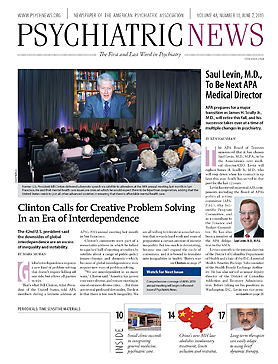Psychiatry is regarded positively by medical students, but as a career choice was rated poorly, according to a systematic review of studies surveying medical students in the United States and around the world.
“Decades of research aimed at identifying attitudes toward psychiatry have found that, overall, medical students have positive attitudes toward psychiatry,” said Zaza Lyons, M.P.H., of the University of Western Australia’s School of Psychiatry and Clinical Neurosciences in the May Academic Psychiatry. “However, recruitment rates to psychiatry training programs remain low in many countries…. [A]ttention now needs to focus more closely on psychiatry curricula, development of innovative teaching strategies, and reduction of stigma toward mental illness. This may be helpful in overcoming the negativity that students have toward psychiatry as a career, improving recruitment rates to psychiatry training programs, and putting psychiatry on a more positive foundation for the future.”
In the study, Lyons undertook a systematic review searching several electronic databases using the following key words: medical students, attitudes, psychiatry, and career. The studies included in the review were conducted in 22 countries. The countries with more than one study were the United States, Pakistan, India, the United Kingdom, and Israel.
A total of 12,144 students, from 74 medical schools, were surveyed across all studies. Response rates ranged from 49 percent to 100 percent, with 13 studies reporting rates of over 85 percent.
Overall, the students did not rate psychiatry highly as a career choice: 14 studies found that psychiatry was chosen as a career by less than 5 percent of the sample; in three studies, it was chosen by between 5 percent and 10 percent of the sample; and in six studies, by 10 percent or more. In two studies only one student nominated psychiatry as a chosen career.
Most studies reported a mix of both negative and positive attitudes toward psychiatry. The attitudes expressed remained consistent between the cultures and countries where the studies were conducted. The majority, however, found that overall student attitudes were quite positive and that such attitudes remained consistent between cultures and countries.
Positive factors cited by the students included the merits, intellectual challenge, and efficacy of psychiatry; personal rewards of practicing psychiatry; and perception of psychiatrists as professionals. Negative factors included perceived lack of scientific foundation; perceived low status, prestige, and financial reward of psychiatry; difficulties with the patient population and treatments; a sense that the field is depressing and frustrating; and lack of opportunity to use their clinical skills.
“The implementation of creative and novel programs, and the availability of elective options for students who have performed well in clerkships or expressed a particular interest in psychiatry, may be valuable in increasing recruitment,” Lyons suggested.
But Sidney Weissman, M.D., a former APA trustee who has had a long-time interest in education, recruitment, and workforce issues, said the report’s conclusions are “simplistic” and stressed that—in the American setting anyway—educators need to focus very specifically on the clerkship experience, providing students not only with a more consistent vision of what psychiatry is about, but exposure to a wider array of patients.
“Psychiatry has a number of problems in creating meaningful clerkships for medical students,” he told Psychiatric News. “On one hand, we attempt to teach regarding the discipline of psychiatry. On another, we address issues of relationship to patients and in a broad sense varied behavioral aspects of medicine. Psychiatry clerkships may be on inpatient units that vary considerably, with either acute or chronically ill patients, substance abuse units, consultation-liaison units, or outpatient clinics. We do not offer students around the country a consistent picture.”
“In whatever unit psychiatry clerkships occur, students must see varied patients and patients who get better,” Weissman added. “Some students may only experience psychiatry on inpatient drug treatment units with patients who have relapsed a number of times. Such a unit is not an appropriate setting for medical students to learn psychiatry, but not all medical schools have adequate training sites for medical students. Clerkships must be adequately staffed, and students must see a board array of patients just as they do in other clerkships. This is not innovative but basic teaching.” ■
